

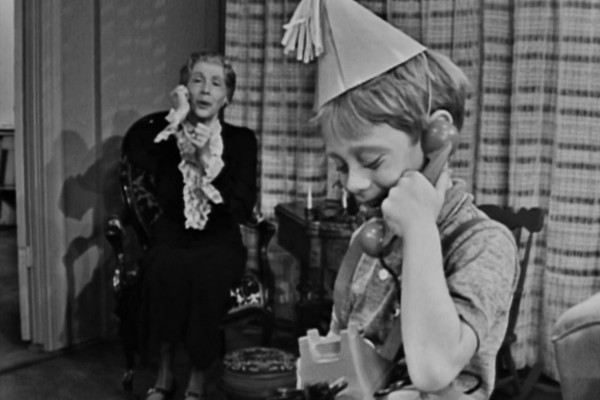
Billy Mumy makes his first appearance in the series as a young boy with a domineering grandmother, who speaks to him from beyond the grave. A good debate regarding season two would be which six episodes would have been best given the videotaped treatment, as it's a technique, as here, that greatly distracts from the quality of the stories. As can be seen in the above screen cap, even on Blu-Ray the print looks muddy and lacking in clarity. Lastly, look out for a relic of the time when it was made... the parents of the child sleep in separate beds, something which also happens with the married couple in A Most Unusual Camera.
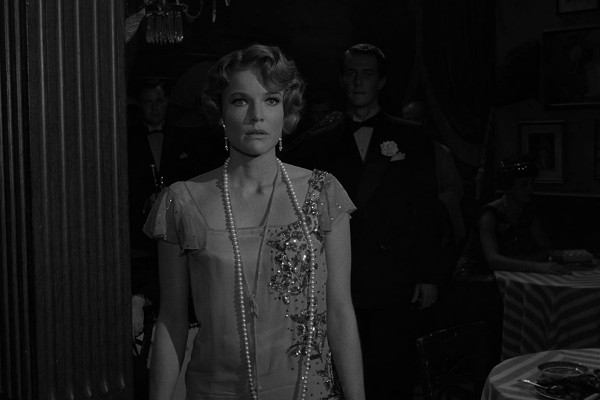
The only Twilight Zone episode written by E. Jack Neuman, it features an aged actor, yearning for his past. Openly cheated on by his new, much younger wife, Booth Templeton (Brian Aherne) gets his wish to travel back in time and revisit his past life, including his deceased first wife. However, when he gets there, he finds that the past he left behind is now all too frivolous for him, and it's a past that finds his older self too dull.
While this episode touches on familiar themes for the series, and it's not entirely clear what the "past" is (a mixture of the actual past and a theatre production of his life, which is a little muddled), it's an episode with much poignancy, all of it in the hands of Aherne, who is superb. A particularly striking shot occurs, as pictured, when he leaves the "past" and the ghosts of yesterday mourn his leaving. While the storytelling device might be a little confused, the emotional theme of the story is strong, and it's a shame Neuman didn't write more for the series.
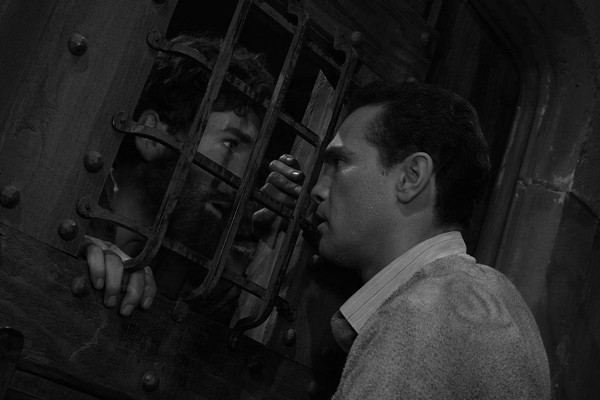
This Charles Beaumont tale is one that the modern-day viewer really needs to "buy into", as it's very much a homage to old Universal movies, complete with lightning and appropriate stock music. It's never played any less than seriously, but some of the more melodramatic moments may cause sniggers rather than shock if not approached in the right frame of mind.
A particular point of contention is the appearance of the Devil himself, which seems to echo German expressionism of the 20s or 30s, and can look unintentionally comic, particularly when he vanishes in a puff of smoke. Rod's presence in this one can be a rare hindrance, as he's crudely dubbed over the top of the action rather than integrated within it. Better was his "next time" spot the previous week, where he set up the tale without giving away whether or not the Howling Man would be released right at the end of the story.
"Next week on the Twilight Zone you'll be close to the elbow of the people who let him out."
Oh. Wait...
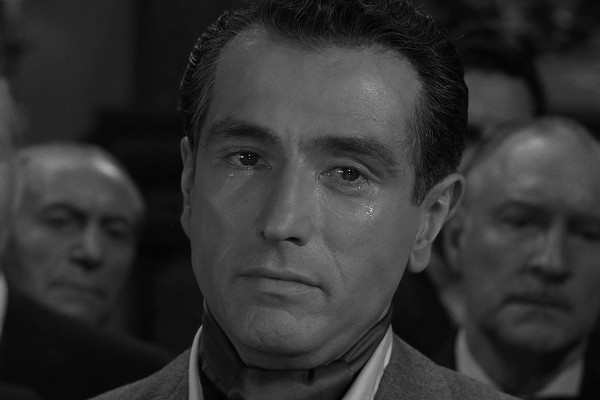
A continual question regarding the Twilight Zone is how much rewatch value it has, when so many of the episodes are twist-based, and the initial shock is so much a part of the experience. The importance of the twist, if there is one, varies from episode to episode. Some of them, no matter how well done, are almost exclusively based around a solitary shock reveal, such as this season's The Eye of the Beholder.
The Silence is arguably one such episode, but the telling is so well done that it doesn't detract, even if you've seen it before and remember where the journey will take you. It's less SF or fantasy orientated than almost any other episode, simply concerning a bet: a man in a gentleman's club bets a blabbermouth $500,000 that he can't remain silent for an entire year. It's a story that could fit many other anthology shows, and, while Serling's plot is clever, it's heavily indebted to Chekhov's "The Bet". And yes, it is a good twist.
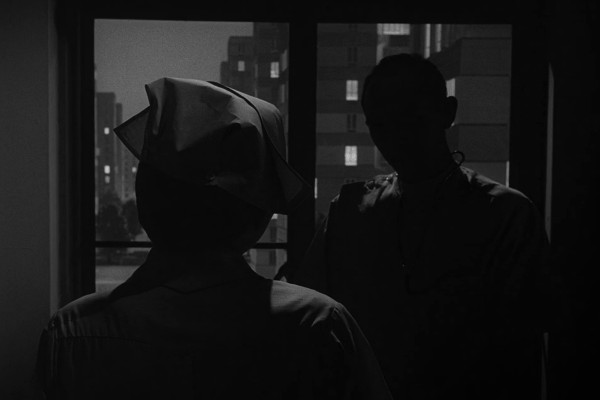
One of the accepted "classics" of the series which, while rated fairly highly here, is, like The Invaders, an overrated instalment. Due to threatened legal action with someone else trying to use the Eye of the Beholder name, CBS removed the original title and temporarily renamed it "The Private World of Darkness" for repeats while the legal issues were resolved. And that, right there, is the whole point. Discussion of whether a "twist" is obvious or not is purely subjective, as what may come as a surprise to some may be startlingly apparent to others. But while this artfully produced episode may possibly have contained some power under the alternate title, its original title may as well be, for all intents and purposes, "she's really good-looking at the end."
Add this to direction which, while commendable, makes considered pains to disguise the appearance of the "normal" humans, to the point where it's almost spelt out long before the ending. The camera moving away as a nurse, back to the camera, turns around to take a cigarette, gives a heavy indication - when this is followed by Rod walking out for his introduction, face unobscured, the game is already up for a huge percentage of the audience. What follows is half interesting discussion on the nature of state oppression, and half overt obscuring of characters' faces like it's a clip from Austin Powers.
Whether the laboriously signposted "cure" for a patient's "ugliness" by a hospital staff full of mutants is something you guessed within the first five minutes or not, what can't be avoided is how preachy it all is. The Twilight Zone is by nature a preachy show, but this one really hammers the viewer over the head with it, stating outright the title four times. Despite the deep criticisms I have regarding this story, it's still of sufficient quality to rate this highly in the ranking. Is The Eye of the Beholder iconic? Yes. Is it well performed and made? Yes. Is it one of the most famous episodes of the entire series? Yes. Is it overrated? Again... yes.

One of the finest of the videotaped episodes, this is a beautiful, heartbreaking tale about a man in boarding house yearning for years gone by. When he digs out his old radio set, he finds it playing concerts and plays from the 1940s, but no-one else believes him, not even the ex-love he never married.
Written by Charles Beaumont and based on a story by Oceo Ritch, this is wonderful, touching stuff, left with a suitable sense of ambiguity. One particular highlight is the opening montage of TV shows, a savage attack on commercial television... made doubly amusing with the knowledge that the Twilight Zone was sponsored by so many commercial advertisers that Serling himself had to present many of these ads.